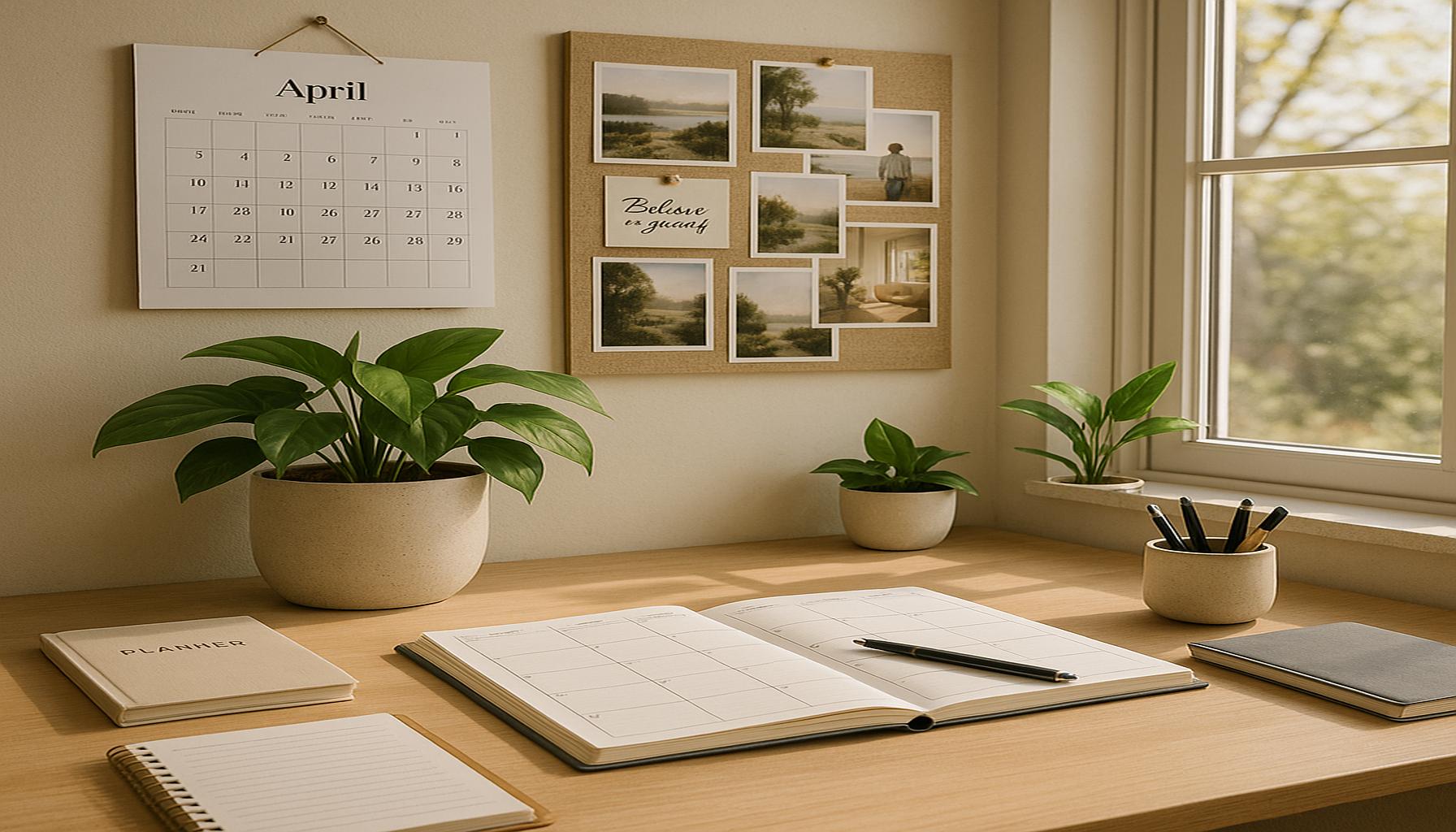Living with Intention: Personal Organization Strategies for Everyday Life

The Impact of Intentional Living on Daily Life
Living with intention is more than just a trendy phrase; it’s a philosophy that empowers individuals to take charge of their lives amidst the chaos of modern existence. In a nation where distractions are constant—whether from work emails, social media notifications, or the hustle and bustle of daily chores—the power of personal organization strategies becomes evident. It is through focused organization that one can sift through the noise and concentrate on priorities that truly matter.
For instance, consider the impact of increased productivity. By prioritizing tasks effectively, individuals can streamline their routines, allowing them to accomplish more in less time. Techniques such as the Eisenhower Matrix help classify tasks based on urgency and importance, making it easier to tackle what really needs attention first. This systematic approach can lead to significant time savings and a sense of control over one’s daily agenda.
Moreover, improved mental clarity is a notable benefit of intentional living. Clutter, both physical and mental, has been shown to adversely affect decision-making processes. The simple act of decluttering one’s workspace or home can lead to a clearer mind, ready to make judicious choices. As the author Virginia Woolf famously said, “For most of history, Anonymous was a woman.” In today’s context, however, anonymity can be more about drowning in distractions than navigating personal identity. Reducing distractions is essential for personal growth.
Finally, the fulfillment that comes from seeing your personal goals realized cannot be understated. When individuals take the time to set clear, realistic objectives, they often find that achieving these goals provides a deeper sense of purpose in their lives. Whether it’s learning a new skill, completing a home project, or simply spending more time with family, intentional living shapes a pathway toward greater satisfaction.
The journey to a purposeful lifestyle begins by identifying one’s core values and realistic aspirations. Understanding what truly matters allows for a customized approach to organization, tailored to unique circumstances and aspirations. This self-exploration tends to breed insights that not only illuminate individual paths but also encourage a more meaningful existence.

In the upcoming sections, we will explore practical personal organization strategies designed to tackle the everyday challenges faced by individuals across the United States. From adept time management techniques to efficient decluttering methods, readers will learn how to cultivate an intentional lifestyle that can significantly elevate their daily experiences.
Key Personal Organization Strategies to Embrace Intentional Living
Embracing a lifestyle focused on intentional living involves more than just decluttering one’s physical space; it requires a comprehensive approach to personal organization that fosters efficiency and clarity across various aspects of life. Through strategic organization, individuals can better navigate their responsibilities and free up valuable time for activities that align with their core values and aspirations.
One foundational strategy is the development of effective time management skills. With numerous demands competing for attention, it’s vital to establish a robust scheduling system that prioritizes tasks effectively. A popular method involves creating a daily to-do list where tasks are ranked by urgency and importance, greatly enhancing productivity. Rather than overwhelming oneself with a long list of activities, focusing on two or three key priorities ensures that essential tasks are completed without the stress of a never-ending agenda.
Additionally, implementing the Pomodoro Technique can offer relief from the pressure of prolonged focus. This strategy involves working in short, concentrated bursts (typically 25 minutes) followed by a brief break (5 minutes). This technique not only maintains high levels of productivity but also prevents burnout, allowing for sustained motivation throughout the day.
Another crucial element of personal organization in the context of intentional living is the practice of habit stacking. This method involves linking a new habit to an existing one, thereby embedding the new practice into daily life seamlessly. For instance, if an individual wants to incorporate daily reading into their routine, they might choose to read for ten minutes after their morning coffee. By building upon established habits, individuals can more easily cultivate new, enriching practices.
- Define your core values: Understanding what truly matters to you provides a framework for your personal organization strategies. Knowing your values helps sift through what deserves your time and attention.
- Create a vision board: Visual aids can serve as constant reminders of your goals and aspirations. This tool keeps one focused on long-term objectives while managing daily tasks.
- Declutter regularly: Establish a routine for decluttering your space—both physical and digital. Regularly clearing out unnecessary items fosters clarity and mental space, enhancing intentional living.
Practicing these organizational strategies inevitably leads to improved decision-making capacity. When individuals cultivate a structured environment, they find it easier to align day-to-day actions with larger life goals. In doing so, the distractions that often derail focus and energy can be minimized, allowing for a more purposeful existence.
In summary, intentional living is not simply about setting lofty goals; it’s about establishing a firm foundation through effective personal organization strategies. By mastering time management, habit stacking, and maintaining a clear environment, individuals can elevate their everyday experience and authentically connect with their aspirations. In the following sections, we will dig deeper into these concepts with practical examples and additional strategies tailored for diverse lifestyles.
Living with Intention: Personal Organization Strategies for Everyday Life
In today’s fast-paced society, the need to manage time and resources effectively has never been more crucial. Implementing personal organization strategies can significantly enhance your productivity and overall well-being. Let’s explore some key aspects that contribute to living with intention through effective personal organization.
| Strategy | Benefits |
|---|---|
| Time Blocking | Helps in allocating focused time for tasks, reducing distractions. |
| Daily Prioritization | Ensures that the most important tasks are tackled first, enhancing productivity. |
These strategies can lead to greater efficiency and an improved work-life balance, enabling you to make space for what truly matters in your daily life. By focusing on the essential, you can reduce overwhelm and cultivate a more intentional way of living. Additionally, the integration of tools such as planners or digital apps facilitates effective organization, making the process not only easier but also more enjoyable.
Embracing personal organization strategies is the key to unlocking a more fulfilling life. Explore various methods, adjust them to your own needs, and witness the transformative effects they can have on your daily routine.
Integrating Mindfulness and Reflection into Personal Organization
Intentional living transcends the practical mechanics of organization; it also demands a deeper connection to one’s inner thoughts and emotions. By weaving mindfulness and reflection into the fabric of daily life, individuals can enhance their personal organization strategies and create a more authentic existence. Mindfulness encourages individuals to be present in the moment and aware of their feelings, which can significantly impact decision-making and prioritization.
One way to incorporate mindfulness is through the practice of mindful planning. Instead of hastily outlining daily or weekly tasks, individuals might take time at the beginning of each week to reflect on their emotional states and energy levels. By acknowledging how they feel, they can tailor their schedules accordingly, prioritizing tasks for when they know they’ll be most effective. This process transforms planning from a chore into a thoughtful exercise that considers personal capacity and well-being.
Furthermore, integrating routine reflection periods can have a profound impact on personal organization. Setting aside time at day’s end for reflection allows individuals to assess what went well and what didn’t, leading to adjustments that can improve future productivity. Journaling can serve as an effective outlet for this, providing a space to articulate feelings, challenges, and triumphs. By regularly documenting thoughts, individuals gain clarity on their priorities and passions, reinforcing an intentional approach to daily life.
Beyond planning and reflection, embracing the art of mindful decluttering can significantly enhance living spaces and mental clarity. In a consumer-driven society, it’s all too easy to accumulate unnecessary items, leading to overwhelming environments. Mindful decluttering involves intentional decision-making regarding what to keep and what to let go of. A valuable technique is the KonMari Method, popularized by Marie Kondo, which encourages individuals to keep only those items that “spark joy.” This philosophy not only promotes a tidy environment but also fosters emotional well-being by surrounding oneself with positivity.
- Establish a mindfulness practice: Incorporating techniques such as meditation or deep-breathing exercises can ground individuals, allowing them to gain clarity before organizing their tasks and schedules.
- Engage in regular gratitude practices: Recognizing accomplishments and expressing gratitude can shift focus from what’s lacking in life to what one already possesses, aiding in prioritization and reducing stress.
- Create a digital detox plan: Limiting screen time and the consumption of digital content can clear mental clutter, providing more space for intentional decision-making and creative pursuits.
As individuals seek to align their actions with their core values, these mindfulness strategies play a pivotal role in personal organization. Maintaining intentional living requires consistent effort and adjustment, making it vital to regularly check in with both physical spaces and mental states. Through cultivating awareness and practicing these strategies, anyone can navigate through their daily lives more purposefully.
Conclusion
Embracing the concept of living with intention through personal organization strategies can lead to profound transformations in our daily lives. By integrating methods informed by mindfulness and thoughtful reflection, individuals can navigate their routines with an awareness that fosters not only productivity but also emotional well-being. In a fast-paced world filled with distractions, taking a step back to prioritize tasks according to not just necessity but also personal energy levels helps to create an environment where intentional living thrives.
Practices such as mindful planning, reflective journaling, and mindful decluttering provide essential tools for individuals seeking to streamline their lives while staying aligned with their core values. As they cultivate awareness of both physical and emotional spaces, they facilitate a lifestyle that champions authenticity and joy. Indeed, adopting a digital detox plan or a gratitude routine can pull us away from the noise of consumerism and acute stress, allowing us to embrace what truly matters.
Ultimately, the journey toward living with intention is ongoing, requiring adaptation and commitment. By continually checking in with ourselves, both mentally and physically, we ensure that our lives reflect our aspirations rather than mere obligations. To explore these strategies further, consider diving into resources on mindfulness practices, organizational techniques, and methods to enhance emotional clarity to inspire deeper connections with yourself and your surroundings. In doing so, you will not only improve your organization but also enrich your entire life experience.
Related posts:
How Intentional Living Can Transform Your Minimalist Lifestyle
Living Intentionally: Minimalism as a Path to Clarity
The Benefits of a Minimalist Approach to Personal Organization
The Art of Minimalism: How Intentional Living Can Transform Your Personal Organization
The Impact of Intentional Living on Personal and Spatial Organization
The Connection between Minimalism and Mental Health: Living Intentionally in a Chaotic World

Beatriz Johnson is a seasoned minimalist and writer with a passion for simplifying the complexities of personal organization and decluttering. With over a decade of experience in the field, she specializes in topics like minimalist living, efficient organization strategies, and creating intentional spaces. Through her work, Beatriz empowers readers to make mindful decisions about their belongings, streamline their lives, and embrace a more organized and fulfilling lifestyle.